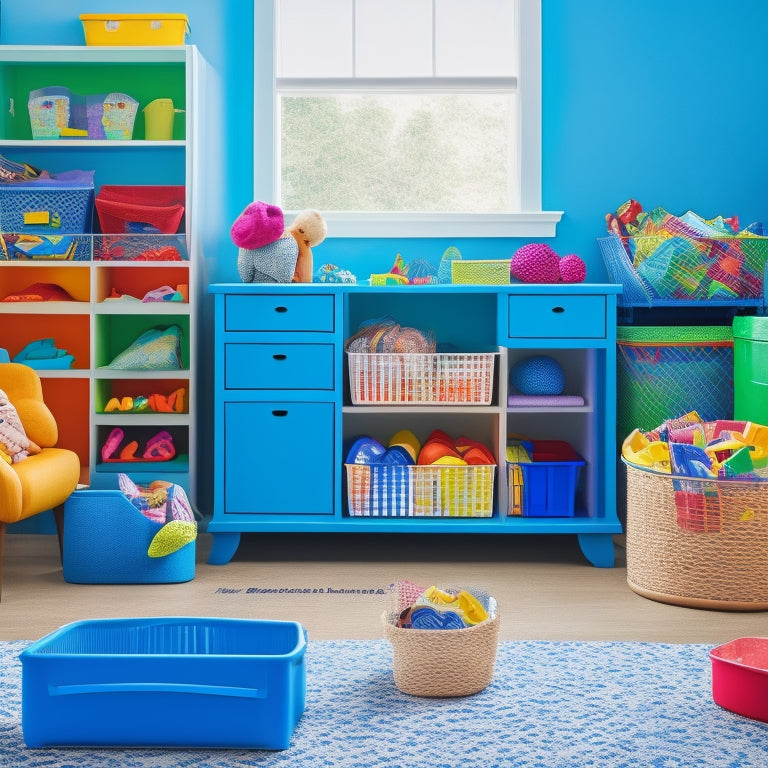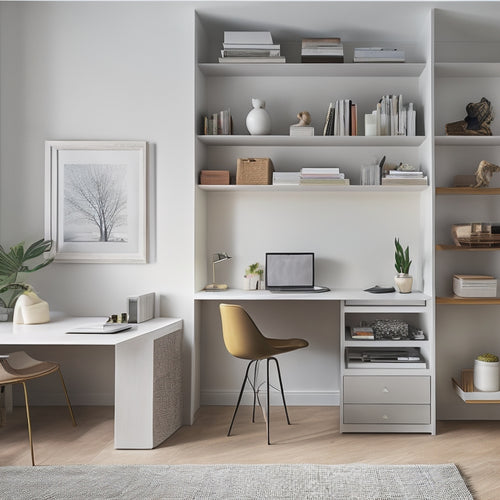
Crafty Organizer's Family Decluttering Tips Worksheet
Share
Effective family decluttering requires a pivotal approach that combines strategies for managing unique household needs, organizing schedules, and involving all family members in the process. A vital step is creating a clutter-free home by establishing a mindset shift towards collective responsibility and adopting family organization habits. Organizing kids' spaces is also essential, focusing on play, creativity, and learning while utilizing effective toy storage solutions. By implementing these strategies and maintaining regular tidying routines, families can achieve a functional living space. Explore the detailed guide to uncover more expert tips and practical tools to transform your living space.
Key Takeaways
• Tailor a decluttering approach to your family's unique needs and schedule dedicated time for decluttering sessions.
• Involve all family members in the decluttering process to promote responsibility and teamwork.
• Establish a "one in, one out" policy to prevent clutter buildup and encourage regular purging of unwanted items.
• Designate tasks based on age and ability to ensure everyone is engaged and contributing to the decluttering effort.
• Set regular time slots for maintenance and assessment to uphold the organization and make adjustments as needed.
Decluttering Strategies for Families
Effective family decluttering requires a tailored approach that acknowledges the unique needs and dynamics of each household. Implementing a combination of strategies can help facilitate a more streamlined and organized living space.
One major family decluttering challenge is finding time to declutter amidst busy schedules. To overcome this, organizing family schedules is essential. Set aside dedicated time for decluttering and involve all family members to instill a sense of responsibility and teamwork. Designate tasks according to age and ability, making it a fun and engaging experience.
Creating a Clutter-Free Home
In order to create a clutter-free home, it is vital to establish a mindset shift, where every family member understands that maintaining an organized living space is a collective responsibility that requires ongoing effort and commitment.
By adopting family organization habits, you can overcome decluttering challenges and create a sense of belonging. Start by identifying storage solutions that work for your family's unique needs and implementing them consistently.
Establishing family routines, such as daily tidying and weekly cleaning, can also help maintain a clutter-free environment. By working together and making organization a priority, your family can enjoy a more peaceful and functional living space.
Organizing Spaces for Kids
Harmony is restored in the home when kids' spaces are organized, allowing them to focus on play, creativity, and learning, rather than wasting time searching for lost items or getting bogged down in clutter. Effective kids' toy storage solutions, such as labeled bins and shelves, help maintain a sense of order and encourage responsible play habits.
Organizing kids' closets is also vital, as it teaches them the importance of categorizing and maintaining their belongings. Consider implementing a 'one in, one out' policy to prevent clutter from building up again.
Managing Family Members' Stuff
With multiple family members comes an accumulation of belongings, making it essential to establish a system for managing each person's stuff to prevent clutter from taking over the home.
Here are some strategies to help you manage family members' stuff:
-
Implement family closet organization systems, such as assigning each person a section or using dividers to separate clothing and accessories.
-
Establish donation guidelines to encourage family members to regularly purge items they no longer need or use.
-
Organize shared play areas by categorizing toys and assigning a home for each item, making it easier for kids to find what they need.
- Create toy rotation schedules to rotate toys every few months, keeping playtime fresh and exciting while reducing clutter.
Maintaining Your Organized Space
To guarantee your newly organized space remains clutter-free, set aside regular time slots to maintain and adjust your systems as needed.
Establish daily routines that promote tidiness, such as putting away toys and belongings after use.
Implement storage solutions that are accessible and functional, making it easy for family members to maintain organization.
Schedule weekly and monthly reviews to assess what's working and what areas need improvement.
By dedicating time to upkeep, you'll prevent clutter from building up and maintain your space as a haven for relaxation and productivity.
Consistency is key, so stick to your schedule and make adjustments as needed to uphold your organized space.
Frequently Asked Questions
How Do I Get My Family to Follow the Organizing System I Set Up?
According to the National Association of Productivity and Organizing Professionals, 80% of people struggle to maintain organized systems. To overcome this, focus on team motivation by setting realistic goals and celebrating small wins, and encourage habit formation through consistent routines and positive reinforcement.
Can I Reuse Old Storage Containers for New Organizing Projects?
When reusing old storage containers for new organizing projects, consider a Container Makeover by creatively repurposing them with a fresh coat of paint, decorative labels, or decoupage, giving old containers a new life and purpose.
What Are Some Kid-Friendly Ways to Explain the Importance of Decluttering?
"Did you know that the average American child owns over 200 toys, yet only plays with 12 daily? To instill a love for decluttering in kids, introduce 'Clutter Bugs' vs. 'Space Savers' games, making tidying a fun, collaborative effort."
How Often Should I Review and Update Our Family's Organizing Systems?
To maintain effective organizing systems, schedule regular System Checks, ideally every 3-6 months, to assess and refine processes, fostering Habit Formation and ensuring adaptability to changing family needs, promoting a sense of control and harmony.
Are There Any Specific Organizing Products You Recommend for Families?
When building a strong foundation, a sturdy framework is essential. Similarly, in family organizing, the right tools are vital. I recommend Label Makers for clarity and Shelf Dividers for categorization, creating a harmonious and functional space that fosters a sense of belonging.
Related Posts
-

7 Essential Strategies for More Storage Space
Take back control of your space by implementing these 7 essential strategies for more storage space. Start by maximiz...
